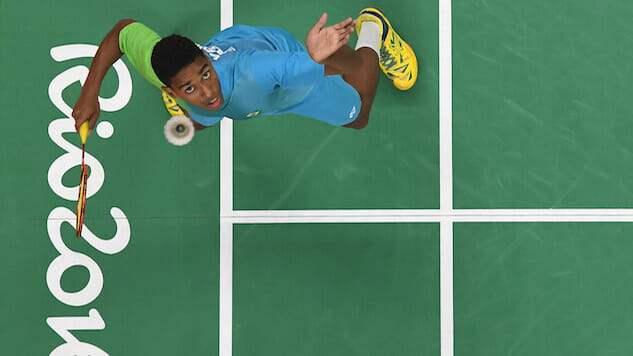A Hometown Hero Made Badminton Rio 2016’s Most Unexpectedly Exciting Sport
Ygor Coelho de Oliveira's unlikely story garnered him a lot of hometown love
Photos courtesy Getty Images
Brazilian fans love to cheer for the underdog nearly as much as they love to root for their fellow Brazilians. This meant that one of the most passionate crowds at the Games wasn’t at swimming, gymnastics or volleyball—it was at badminton, where Brazil was being represented for the first time, by one of the lowest-ranked competitors in the whole tournament.
Ygor Coelho de Oliveira is an unlikely sports hero. He was born and raised in one of Rio de Janeiro’s favelas, low-income neighborhoods sprinkled throughout the city where the state often have a minimal presence. His dad, Sebastião de Oliveira, was raised in an orphanage; Sebastião spent his summers collecting recyclables for cash at Rio’s sprawling Gramacho dump alongside his mother.
But Sebastião made it out of Gramacho. After he became a high school P.E. teacher, got married and had a few children, he became determined to give back to the favela community that he had adopted as his home.
This is where the story gets peculiar—in soccer-dominant Brazil, how did Ygor’s dad land on a badminton social project? A colleague of his came back from a trip to Italy with a badminton racquet. After batting the birdie back and forth, he decided that creating the Miratus Badminton Center would become his destiny.
After many years of hard work, he built a four-court badminton center, attached to his home in the favela. Over two hundred kids from the community pass through there each day, but the center’s biggest success story is Ygor.
Ygor and his father have captured Brazilian hearts — their story has appeared on the nation’s largest television networks, as well as on the likes of CNN, the BBC and in the pages of the New York Times—attracting throngs of locals to a sport that many Brazilians barely even knew existed.
Even with few regular fans of badminton, the excitement was palpable at Ygor’s Olympic badminton debut. When they announced his name at the start of the match, the crowd went wild —some 50 kids from the badminton school were in the stands, dressed in their canary yellow and green badminton tee shirts. His father, overwhelmed by local TV cameras, had a Brazilian flag draped on his shoulders and a glisten in his eye.
“The experience was fantastic, the stadium was packed, all my friends and family where there. I wasn’t expecting it to be so full,” Ygor said in an interview last week.
“I never imaged that the crowd would be this animated. It was the only time that’s happened in my career, or in my life. I’ve never seen a crowd cheering like that for me,” he said, pointing out that when he’s seen big crowds at badminton matches before, although it’s in countries like China and Indonesia, where the sport is incredibly popular—and where the public isn’t rooting for him.
Ygor won the first few points, but quickly fell behind to his opponent, Scott Evans, a 28 year-old from Ireland, who was ranked 23rd at the height of his career. Ygor is ranked 64th. He lost the first set 8 to 21.
For the second set, they switched sides and Ygor began to come back, at one point with a substantial lead. The crowd became electric, cheering for him with the same fervor that they have when rooting for their soccer team. Brazilian flags waved everywhere and chants of Yyyygoorrr rang throughout the convention center turned badminton stadium.
-

-

-

-

-

-

-

-

-

-

-

-

-

-

-

-

-

-

-

-

-

-

-

-

-

-

-

-

-

-

-

-

-

-

-

-

-

-

-

-








































